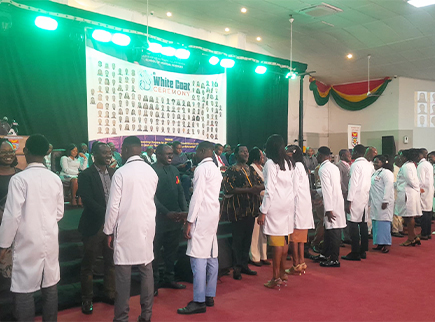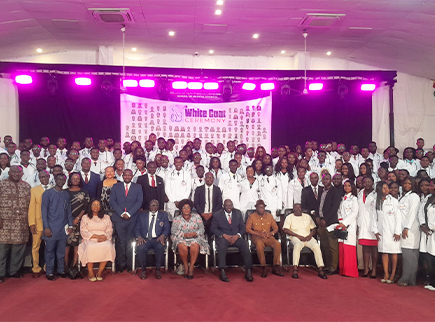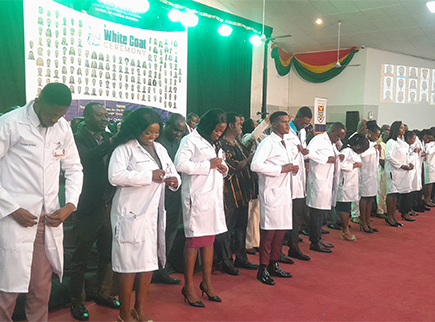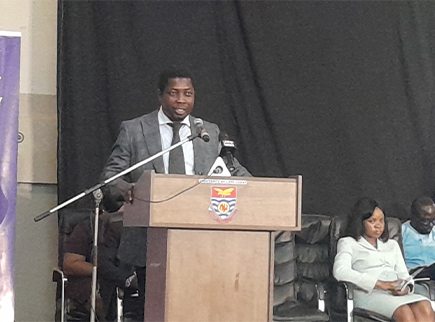The School of Medical Sciences (SMS) of the University of Cape Coast (UCC) has held its 16th White Coat ceremony with a call on medical students and young doctors to embrace emerging technologies to advance the delivery of health care in Ghana.
Elated parents, guardians and family members were among a host of dignitaries who thronged the UCCSMS Auditorium to witness the colourful ceremony which officially ushered some155 level 400 medical students into clinical training, effectively transitioning them from the classroom to the real world of work.
In effect, the students will no longer engage in practical work with mannequins and other objects but with real patients in facilities where they will be deployed to.
This year’s ceremony was held under the theme: “Empowering Doctors for the Provision of Healthcare in the 21st Century Through Innovative Medical Education.”
Mr Daniel Morkla, the Chief Executive Officer (CEO) of HealthTech Ghana Limited, underscored the critical role of emerging technologies such as Artificial Intelligence (AI) in the advancement of modern medical care, advocating strongly for the adoption of same.

Contrary to the fears of many, he indicated that technologies like AI were not a replacement for human expertise but must be harnessed for the betterment of the medical profession.
He stressed that it was impossible to fight technology in today’s complex world and, thus, young doctors must embrace it and learn to use it properly to enhance their work.
“Health care technology must be your friend because it makes things easier. Today, we are using AI to generate reports, and the AI picks up things a radiologist may normally not see,” he said.
As Ghana worked to fully digitised its healthcare system, Mr Morkla maintained that the core competencies of a modern-day doctor must include computing skills.
“With the evolution of medical technology in healthcare delivery aided by AI, it is imperative that medical education infuses some of these technologies into the training of doctors and the frontline health professionals,” he stressed.
The HealthTech Ghana Limited CEO, however, advocated the incorporation of bespoke technologies to solve Ghana’s unique healthcare challenges.

He advised the students to believe in their vision and follow it through with commitment and dedication.
Prof Sebastian Eliason, Dean of SMS, who was overseeing his fifth and last White Coast ceremony, cautioned that the white coat was not a symbol of expertise but of humility, which showed that they were only learners.
He said with UCC’s innovative medical education, the students had been equipped with the knowledge and necessary skills to adapt and lead in the new world characterised by global pandemics, and rapid technological advancements.
He entreated them to commit to ethical practice, social responsibility, and the wellbeing of the wider community while cultivating a resilient and adaptable approach to learning as medical knowledge was constantly expanding.
“Carry with you the weight of the profession’s trust, the legacy of those who came before and the responsibility to shape the future. Embrace the challenge ahead for it is through innovation that you will truly make a difference,” he said.
Prof Eliason stressed the importance of inter-professional teamwork in the medical profession and urged the students to build trusting relationships with their patients.

In a statement delivered on his behalf, Prof Denis Worlanyo Ahetor, the Acting Vice Chancellor of UCC, expressed the school’s commitment to ensuring a medical education that was relevant to Ghana, Africa and the world at large.
To be effective, he advised the medical students to be lifelong learners and compassionate leaders who approached patients with empathy.
He further urged them to learn from their seniors and mentors as well as from their own mistakes.
Dr Agnes Anane, the Central Regional Director of Health and alumna of the school, emphasised the importance of personal branding and competence in the medical field.
She entreated the students to build their brands consciously and identify their strengths and weaknesses to support one another to grow, and underscored the essence of patient confidentiality, urging the students to respect a patient’s medical condition and treat it as confidential.

